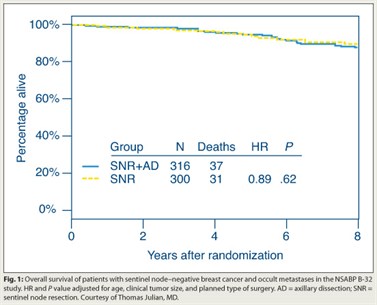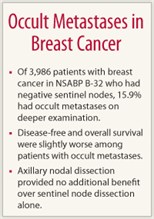In a subanalysis of the National Surgical Adjuvant Breast and Bowel Project (NSABP) B-32 study, nearly 16% of clinically node-negative patients were found to have occult metastases upon more detailed assessment of the sentinel lymph nodes. While a slight difference in outcomes was found among this group, there were no differences according to whether the patients underwent sentinel node dissection or axillary lymph node dissection, Thomas Julian, MD, of Allegheny General Hospital, Pittsburgh, reported at the 2011 Breast Cancer Symposium in San Francisco.1
Clinical Importance Questionable
 “The clinical importance of immunohistochemistry-detected occult metastases is questionable,” said Dr. Julian.
“The clinical importance of immunohistochemistry-detected occult metastases is questionable,” said Dr. Julian.
The NSABP B-32 investigators had previously reported small but statistically significant differences in outcomes for patients found to have occult metastases.2 Patients with occult metastases had a 40% increase in mortality (P = .03) and a 30% increase in distant disease (P = .02), compared with patients with no occult metastases. However, the absolute differences were only 1.2% for mortality and 2.8% for disease-free survival. At 5 years, overall survival was excellent in both groups: 94.6% in those with occult metastases and 95.8% among those without occult metastases.
“So our question was, if there is a difference according to the presence of occult metastases, did the addition of axillary dissection factor into this?” Dr. Julian said, “but we found no effect of treatment on overall and disease-free survival.”
Key Data
 The pathology research team, led by Donald L. Weaver, MD, performed a more detailed assessment of the sentinel nodes, involving deeper sectioning and immunohistochemistry staining. Among the 3,986 patients with clinically and H&E-negative sentinel nodes, occult metastases were identified in 616 patients: 316 in the axillary lymph node dissection arm and 300 in the sentinel node dissection arm (for 51 per arm, occult metastases status remained unknown).
The pathology research team, led by Donald L. Weaver, MD, performed a more detailed assessment of the sentinel nodes, involving deeper sectioning and immunohistochemistry staining. Among the 3,986 patients with clinically and H&E-negative sentinel nodes, occult metastases were identified in 616 patients: 316 in the axillary lymph node dissection arm and 300 in the sentinel node dissection arm (for 51 per arm, occult metastases status remained unknown).
Among patients with occult nodal metastases, complete axillary lymph node dissection did not significantly improve overall survival (HR = 0.89; P = .62; Fig. 1) or disease-free survival (HR = 0.79; P = .16), Dr. Julian reported.
The overlooked metastases were mostly isolated tumor cell clusters (11.1%) or micrometastases (4.4%). However, 0.4% of patients thought to have negative sentinel nodes actually had macrometastases > 2.0 mm. Axillary lymph node dissection identified 23 patients (7%) with additional nodal metastases beyond the sentinel nodes.
The actual differences in outcomes were less than 3%. Therefore, systemic therapy in these patients would add little benefit while conveying toxicity. No benefit in overall or disease-free survival was seen when axillary lymph node dissection to detect the presence of occult metastases was added, especially since only 23 patients had additional  positive non-sentinel nodes, Dr. Julian concluded.
positive non-sentinel nodes, Dr. Julian concluded.
Similar Findings in Other Study
The results are congruent with previous findings from the American College of Surgeons Oncology Group (ACOSOG) Z11 study, which found no survival benefit from complete axillary lymph node dissection compared with sentinel node dissection only (P = .008 for noninferiority).3 In Z11, more extensive dissection revealed that 27% of patients had positive nodes beyond the sentinel nodes, said Armando E. Giuliano, MD, of Cedars-Sinai Medical Center, Los Angeles, who also spoke at the symposium.
“About 27% of patients with sentinel node dissection only had unresected cancer remaining in the axilla,” he noted. “We as surgeons affect survival by achieving local-regional control, and both approaches did that. There was no difference in survival.” ■
Disclosure: Drs. Julian, Weaver, and Giuliano reported no potential conflicts of interest.
Expert Point of View: No Value for Axillary Dissection in Patients with Breast Cancer and Occult Nodal Metastases
References
1. Julian TB, Anderson SJ, Mamounas EP, et al: Effect of axillary dissection for occult detected sentinel nodes metastases on survival: NSABP B-32. 2011 Breast Cancer Symposium. Abstract 80. Presented September 8, 2011.
2. Weaver DL, Ashikaga T, Krag DN, et al: Effect of occult metastases on survival in node-negative breast cancer. N Engl J Med 364:412-421, 2011.
3. Guiliano AE, McCall LM, Beitsch PD, et al: ACOSOG Z0011: A randomized trial of axillary node dissection in women with clinical T1-2 N0M0 breast cancer who have a positive sentinel node. 2010 ASCO Annual Meeting. Abstract CRA506. Presented June 7, 2010.

 Armando E. Giuliano, MD, of Cedars-Sinai Medical Center, Los Angeles, and principal investigator of ACOSOG...
Armando E. Giuliano, MD, of Cedars-Sinai Medical Center, Los Angeles, and principal investigator of ACOSOG...